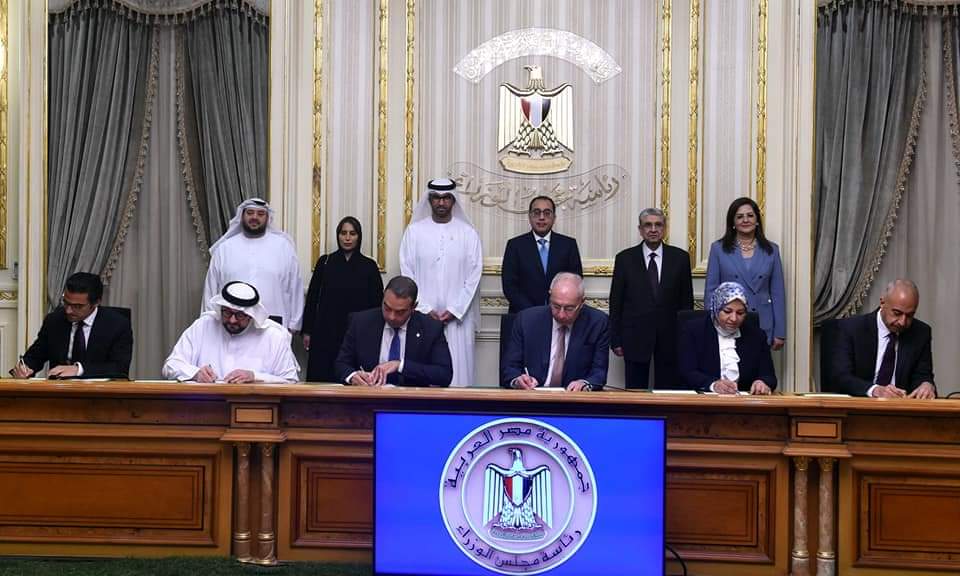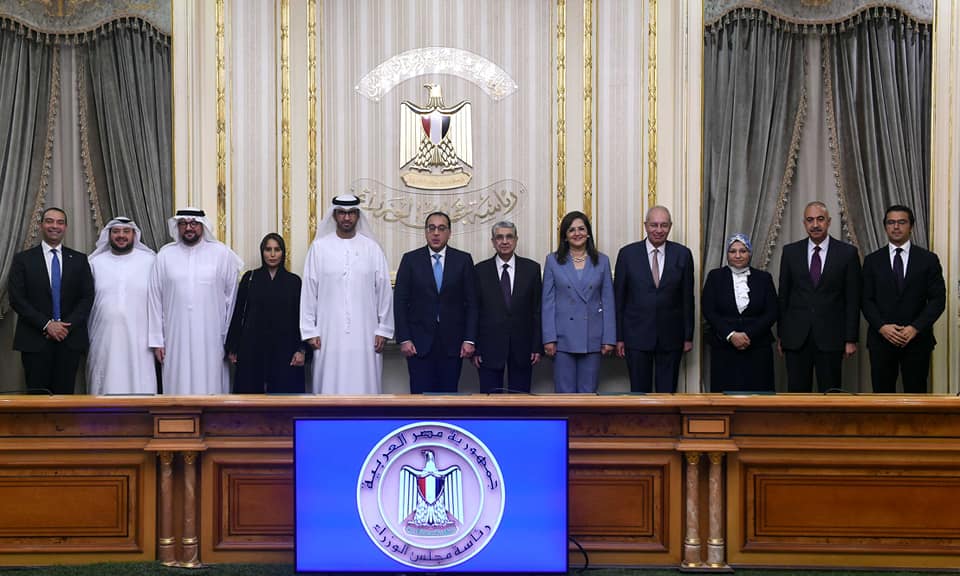- April 24, 2022
- Posted by: Ahmed Abdelatif
- Category: 2022, EN


The Egyptian Prime Minister Dr. Mostafa Madbouly witnessed today, the signing ceremony for 2 Memoranda of Understanding, The MoUs are among the General Authority of Suez Canal Economic Zone (SCZONE) , the Sovereign Fund of Egypt (TSFE) , the Egyptian Electricity Transmission Company(EETC) , the Authority of New and Renewable Energy, the Emirati “Masdar” company, and Hassan Allam Utilities the investment and development arm for Hassan Allam Holding.
The Memorandum of Understanding is aiming to establish projects to produce green fuel for local markets, especially in ships bunkering, and export purposes.
The signing ceremony is held in the presence of Dr. Sultan bin Ahmed Al Jaber, Minister of Industry and Advanced Technology, and the UAE’s Special Envoy for Climate Change, Mrs. Maryam Al Kaabi, UAE Ambassador to Cairo, Dr. Mohamed Shaker Al-Marqabi, Minister of Electricity and Renewable Energy, and Dr. Hala Al-Saeed, Minister of Planning and Economic Development.
The MOUs were signed by: Eng. Yehia Zaki, Chairman of the Suez Canal Economic Zone ,Mr. Ayman Soliman, CEO of the Sovereign Fund of Egypt, Eng. Sabah Mashali, Chairman of the Egyptian Electricity Transmission Company, and Dr. Mohamed El-Khayat, chairman of the authority of New and Renewable, Mr. Mohamed Jameel Al Ramahi, CEO of “Masdar”, and Eng. Amr Allam, CEO of Hassan Allam Holding Company.
According to the 2 memoranda of understanding, “Masdar” and Hassan Allam Utilities will form a strategic coalition that aspires to develop green hydrogen production plants. The project will be implemented in various stages extending until 2030, to produce up to 480,000 tons of green hydrogen annually, through electrolyzers with a capacity of 4 gigawatts.
” This signing is part of the strong brotherly relationship between the two countries Egypt and the United Arab of Emirates. There are directives of President Abdel Fattah Al-Sisi, President of the Republic, to strengthen and consolidate relations of cooperation with the UAE in various sectors. Egypt is working on encouraging investments in the field of green energy projects, as Egypt has potential that qualifies it to become a pivotal and regional hub in this vital field. Green hydrogen will change the shape of the global energy system during this stage and hopefully, our steps will accelerate the energy transition process in the region.” Dr. Mostafa Madbouly, the Egyptian prime minister said.
“Through the vision and directives of the wise leadership in the UAE, we always seek to strengthen relations and brotherly ties with Egypt. We are pleased to conclude these agreements that focus on exploring opportunities for the production of green hydrogen. we will work through Masdar to harness our expertise in this field to support the development of this ambitious project. We look forward to working with our partners in Egypt to enhance our capabilities to provide carbon-neutral and commercially viable solutions in the energy sector.” Dr. Sultan bin Ahmed Al Jaber indicated.
”Today’s signing is the fifth of its kind for green fuel production projects inside Sokhna, as SCZONE has a distinctive location and pivotal ports overlooking the Red Sea and the Mediterranean Sea. SCZONE is qualified enough to be a regional hub for ship bunkering. All the companies now are conducting feasibility studies for the projects in detail to sign and announce the actual contracts in coinciding with the climate summit next November. SCZONE is aspiring to become a hub that includes all international companies working in the field in one area to supply them with all the needed incentives and services that qualify them to produce green hydrogen by 2024.” Eng. Yehia Zaki declared after the signing ceremony.
Hassan Allam Utilities and “Masdar” aim to establish a green hydrogen production plant to be operational in 2026 during the first phase of the project , where the plant will produce 100,000 tons of green methanol annually to supply shipping vessels in the Suez Canal. Electrolyzers within the Suez Canal Economic Zone and on the Mediterranean Sea will provide a production capacity of 4 gigawatts by 2030 to produce 2.3 million tons of green ammonia for export in addition to supplying local industries with green hydrogen.

